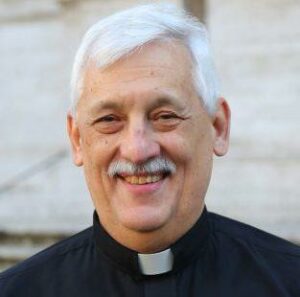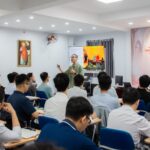The opportunity of the Ignatian Year 2021-2022

Fr. Arturo Sosa, SJ
Superior General
The Ignatian year, which runs from May 2021-the end of July 2022, offers us a great opportunity that, hopefully, we will take full advantage of. We should not let it pass in vain. It is a call to allow the Lord to work on our conversion. We ask for the grace to be renewed by the Lord. We wish to discover a new apostolic enthusiasm inside ourselves, a new life, new ways to follow the Lord. That is why we have chosen as our theme for the year: to see all things new in Christ.
The whole year will be guided by the Universal Apostolic Preferences which, as you know, were announced in 2019 and continue until 2029. We know that assimilating them means conversion for each one of us, for our communities, our institutions and our apostolic works. We ask for the grace of a real change in our day to day life-mission.
At this moment, I am especially addressing our companions in the mission: the lay people, religious and those who, from other beliefs or human convictions, participate in the same struggle. We hope, during the Ignatian year, to share more deeply with you the foundational experience by which the apostolic body of the Society participates in the mission of reconciling all things in Christ. Many of you feel a deep commitment to this inspiration, to the charism that gives life to the Society of Jesus. I thank the Lord for that grace and I thank each of you for your enthusiasm and closeness. We want to take advantage of the Ignatian year to accompany more closely the work that the Holy Spirit is doing in each one of you so that you can feel that call more deeply.
To young people I say: “We want to learn to accompany you. We want to learn from you. Each one of you is unique, born with a special purpose. Ignatius struggled to discover the meaning of his life. In him you can find inspiration as you struggle to make your life meaningful and as you ask how you can contribute to building a better world, where the dignity of people is respected and where you live in a joy-filled harmony with nature. I express our desire to accompany you through what we do and most especially through who we are – people willing to share our time, our dreams and our hopes.”
To my Jesuit brothers of all generations scattered throughout the whole world I say that the Ignatian year is a new call to draw inspiration from Ignatius, the Pilgrim. His inner struggle and conversion led him to a very close familiarity with God. This familiarity, this intense love, allowed him to find God in all things and to inspire others to form together an apostolic body, full of missionary zeal. We are heirs to that charism and responsible for its legitimacy in the times we live in.
For Ignatius, a life of poverty was an expression of intimacy with Jesus, the Lord. More than words, his poverty was a sign of his interior transformation, of his growing vulnerability before the Lord, of his radical indifference to preparing himself to follow God’s will, of his sense that everything came down from above as a gift.
How can we, the present members of the Society of Jesus, receive and live this grace of evangelical poverty?
First of all, by approaching the way of life of Jesus as Ignatius and the first companions did. Yes, an intimate relationship with the Lord is possible if we desire it and ask for it with insistence as we have learned in the Spiritual Exercises. It is an intimacy that is given to us not only to be enjoyed quietly by each one. On the contrary, it is an intimacy that enables us to love and follow more closely Jesus who continues to call us, especially through the poorest and most marginalized, through the cry of the earth, through all that is vulnerable. For the first companions,the life of poverty of each one and of the community was always linked to the care of the poor. That is a substantive part of the charism we have inherited.
Guided by the discernment of the Universal Apostolic Preferences we have accepted the challenge to listen to the cry of the poor, the excluded, those whose dignity has been violated. We have accepted to walk with them and to promote together the transformation of the unjust structures that have become so evident in the current world crisis. And let me be clear: this crisis is not only health and economic but, above all, social and political. The COVID-19 pandemic has shown the serious deficiencies in social relations at all levels, the international disorder and the causes of ecological imbalance. Only the love of Jesus brings definitive healing. We can only be witnesses of that love if we are closely united to Him, among ourselves and with those thrown aside by the world and considered least.
Living our vow of poverty in the current conditions of the world will require changes in our organizational culture. The path of the Spiritual Exercisescan be our guide, starting with a profound renewal of our interior freedom. This leads us, in turn, to Ignatian indifference and makes us available for “what is best” or as we say in Spanish “lo que más conviene”.
We need to recognize our deficiencies and even our sins, in this area, if we want to arrive at a real identification of ourselves with the poor and humble Jesus of the Gospels. As we have done so many times in our contemplation of the call of the Eternal King (EE., n. 98), we can today ask for the grace to renew our desire to imitate the Lord “in bearing all wrong and all abuse and all poverty, actual as well as spiritual”.
As Jesuits, we must ask ourselves what it means in this day and age to introduce changes in our life of religious poverty in order to make it more strict. In the Ignatian text, the full expression is that ‘according to the demands of the times’ we should see if it is necessary to introduce changes to make it more strict. What we want to do is to understand what are the demands of these times as we look to the future. The examination of our life in poverty can become the concrete way to inspire conversion for a re-charismatization of our life-mission.
Dear Jesuit brothers, dear companions in mission: we are entering into what can be a transformative moment for the Society of Jesus. It can be a moment that releases new energy, new freedom, new initiatives, new love for otheors and for our most afflicted brothers and sisters. In remembering St. Ignatius of Loyola and his conversion, we find encouragement. We realise that “Yes, change is possible. Yes, our hearts can be softened. Yes, our world can find new ways forward”. We place our hands in the hands of Jesus, our brother and friend, and we go forth into an uncertain but hopeful future, confident that He is with us and that His spirit is guiding us.
Saint Ignatius of Loyola, pray for us.
May the Lord bless us as we follow Him along the way, poor and humble, this minima compañia collaboradora.
Recent Posts
-

-

-

-
 Unworthy yet called11 months/
Unworthy yet called11 months/








